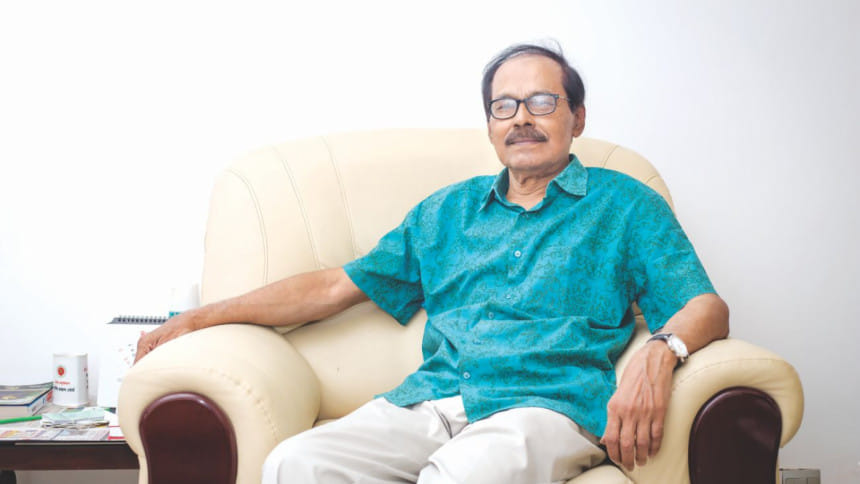Ballad of the Songbird

A nomadic beginning
I grew up in Agartala, at my maternal grandfather's house, who was a lawyer of the Agartala court. I spent a significant part of my childhood there, and the seeds of music were planted in me back then. My friends and I used to bunk classes to go to the movies, and there was a lovely tradition at cinema halls back then; of starting a movie after playing songs. That was sort of my first exposure to music, especially film music. As soon as the recess bell rang, I would rush to the cinema hall, just to hear the songs. Media for listening to music were scarce back then, apart from the expensive and rare gramophones. My father used to work in Kolkata, as a Civil Service officer. For a brief period of my childhood, I spent my time there with my father, but I returned to my grandfather's house after some time. After the partition, my father was posted in Sylhet, and he took me with him. That was where I spent my youth, until after my father got transferred to Rangpur, again. This time, my grandfather shifted to Brahmanbaria, and I took my matriculation exam there. Later, my father admitted me to the Rangpur Carmichael College, but I didn't really like it there. I told father that I wanted to go to Dhaka and study at the prestigious Dhaka College. My uncle used to live there at that time, so I went and studied there.
Nature, Nurture and Fate
I never stopped practicing singing, but it took a while before I entered the music industry. After Dhaka College, I went to Dhaka University, and got introduced to the rich cultural environment there. Back then, it was mostly a centre for all cultural activities in Bangladesh and the hub for nurturing arts and artists.z I met many senior cultural personalities there. I used to attend all events and functions of the university, and even performed there. I was exercising my voice in the ideal environment. There, in one of those events, renowned music composer and director, Karim Shahabuddin heard me and introduced me to the world of film music, debuting as a singer for the film, Ye Bhi Ek Kahani. It was back in the 1960s, when I was still just a student. I never had to look back from there.
Love and Encouragement
I felt loved by a lot of people, something that helped me come this far. When I came to Dhaka University, my seniors used to encourage me to sing and had really high hopes for me. They made me believe that one day I would become a great singer, and motivated me to keep honing my art. Mohammad Asafuddowlah and Anwar Uddin Khan, the famous musicians; Mustafa Zaman Abbasi, the musicologist and many more; they were all a source of inspiration. My friend from Dhaka College, famous actor Nazmul Huda Bachchu; my teacher, Abu Hena Mustafa Kamal and Mohammad Moniruzzaman, they all believed in me. Subal Das, the famous film music director, was my music teacher from my Brahmanbaria days. I got to work with him in some films as well, and learned some valuable lessons. All these people were integral to what I am today.
Natural Evolution vs. Vapidity
Just as human civilization has gone through ancient, medieval and modern ages; arriving at the post-modern age now, music has also changed course. We have to be conscious of this change, and keep the timeline in mind. Music will not remain stagnant as time goes by. It will evolve at its own pace. Time changed everything about our life; the way of living, the values and the culture. Our definition of entertainment also changed. As an inseparable part of life, music strung along. However, art has an obligation: to show us the way, and music is no different. Artists have a duty; not just going with the flow, but also moulding the flow itself, to awaken the finer qualities of men, nurture refined taste and introduce them to the eternal truth that is beauty. 'Satyam Shivam Sundaram', the Sanskrit phrase, declaring the eternity of beauty, should be the motto of an artist. However, the alarming truth is; with the internet, there is an influx of banal and ostentatious content that easily attracts the mass audience, as it does not require thought or creativity. Mediocrity has ceased the fine arts, as the most banal is the most popular right now. But we also have to separate degradation from change. Changes should be welcomed. If you think of music as a rolling stone, stagnancy is also how mosses will gather. Musicians will figure out newer ways to be creative, they will experiment, and that is the way music will flourish. But an artist also must not exercise tyrannical freedom, since music is the 'finest of fine arts'. We have to be careful about the raison d'etre of art: to be beautiful.
The Much Needed Formal Education
When it comes to experimenting, our music industry is chaotic. And the cause of it, in my opinion, is the lack of formal musical education. When you are experimenting, you need to know the ins and outs: whether it be art or science. That knowledge is offered in formal musical education only, something not many of our mainstream musicians go through. Without education, one can only imitate, not create. Any great experimentalist in music came from rigorous musical background, with solid education. If you want to break the rule, you have to know it first. Another important thing is, one must know not only the music of one's culture, but of the rest of the world. Rabindranath Tagore himself, was accused of borrowing from western tunes, and what he had to say is, "Those who can't return what's borrowed with thy own wealth, are the ones who fear borrowing." By understanding the culture of our neighbours and even beyond, we will be able to borrow their wealth and make it our own, exactly what Rabindranath had done. He borrowed and gave back something of his own. Those with British education brought the Bengal Renaissance of the early 19th century. As an artist, you can't forget your roots, no matter how much you borrow.
Message for the Budding Songbirds
I won't be impertinent enough to give out advice, but what I can say for the young bloods is, invest time in formal education, know your classics, your roots, and the music of the world. Know your own culture, hold on to it tightly, and grow from there. And another thing, to me personally, is that nothing is more discordant than the amalgamated Bangla we hear in music, today. Don't sully our beautiful language, no matter what you are doing.
Creative Addictions
Fishing is one of my hobbies, which at one point, was an addiction. There were times I would forget to attend recording sessions as I was engrossed in fishing. Nowadays, I don't fish that much, but I still enjoy doing it once in a while. Otherwise, I spend my leisure time listening to music, reading books and watching television. As a student of Bangla, I have read almost all Bangla classics; but with age, I am leaning more towards non-fiction, science, history, philosophy and travelogues. If I could get the chance to study in university again, I would choose astronomy as my major. I love Stephen Hawking's books. Even when watching television I prefer documentary channels like Discovery Channel and National Geographic Channel. I am extremely fascinated by the works of my teacher, Ahmed Sharif and I have read almost all of his works. I also love poetry; both classic and contemporary. As a librarian, I have been around books almost all my life. I think they are the greatest companion one can have.

 For all latest news, follow The Daily Star's Google News channel.
For all latest news, follow The Daily Star's Google News channel. 



Comments